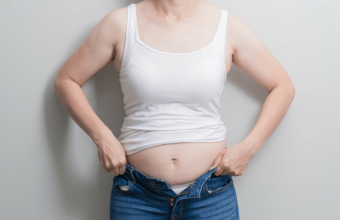Your daughter may be keen to get her period—it is, after all, an important rite of passage—but there are some associated symptoms that may be unsettling for a ‘newcomer.’ Here’s a quick fact sheet aimed at helping you explain some of the more unpleasant aspects of getting your period and how to best manage them.
Below you’ll find useful topics and practical information which you can use as a loose ‘script’ or just as a conversation starter.
Period Cramps and What Causes Them
If you never suffer from period pain or menstrual cramps, then you’re very lucky. Unfortunately, for most preteen and teenage girls, it’s just a plain fact of life that, before and during a period, you may suffer from menstrual cramps (dysmenorrhoea).
These can vary in severity from sharp stabs that make you double over to a nagging pain that spreads through your belly and lower back. Some girls also experience dizziness, nausea, diarrhoea or even vomiting.
Menstrual cramps are caused by prostaglandin, a substance that occurs naturally in your body and behaves like a hormone, causing the uterus to contract. If you don’t ovulate, it’s unlikely that you’ll get cramps during your period. Doctors often prescribe contraceptive pills to ease painful periods—but it can cause abnormal bleeding in some girls.
Tackling Cramps
If you’re suffering from cramps, try a combination of these steps to feel better:
- Regular exercise and stretching
- Lie down at the first stage of pain and gently rub your abdomen to help relax the muscles
- Ask your doctor for a recommendation of herbal remedies or medicines that may relieve symptoms
- Take a warm bath and sprinkle a few drops of lavender, clary sage or rose aromatherapy oils into the water
- Use a hot water bottle or heating pad on your lower abdomen or back
- Ask your mom for an over-the-counter pain reliever like aspirin, ibuprofen or other non-steroidal anti-inflammatory drugs that may be prescribed for significant pain associated with PMS symptoms (for example, backache, cramps or tender breasts).
Heavy bleeding
Most girls lose about 50 millilitres of menstrual fluid during their periods. Only some of that amount is blood. As your body contains more than 10 pints of blood, it won’t miss a little bit lost during your period—and your body makes up for it quickly.
Since the amount of flow and number of days of a woman’s period vary considerably from woman to woman, it’s not easy to know whether your flow is exceptionally heavy. However, if your period lasts longer than seven days, requires a lot of pad/tampon changes per day (changing after two hours or less), or is accompanied by gushing (sudden surges of flow) or clots, then you are probably experiencing flow that is heavier than normal for most women.
Is Heavy Bleeding Dangerous?
Heavy bleeding on its own can cause you to lose iron and make you anaemic (weak and tired). Some of the causes of heavy bleeding are not very serious and, despite the inconvenience, do not require treatment. Others are more serious and warrant treatment to preserve your health.
Very rarely, very heavy bleeding is a medical emergency. If you are experiencing heavy bleeding and are concerned, then you should contact your doctor or go to an emergency room right away. Keeping a diary of your periods, including the number of pad or tampon changes and occurrences of gushes, can be very helpful for your doctor in diagnosing your individual problem.
Irregular periods
For the first two years your periods can be very unpredictable. You could have one period and then wait as long as six months for the next one. One period may last a day, while the next lasts ten days. It typically takes one to two years for cycles to become regular. Just remember that it’s perfectly normal.
Many women experience irregular periods at some time in their lives. The exact causes of irregular periods can vary and are often quite normal. You are the best judge of what is normal for you. If you have a sudden change in the regularity of your periods, chart your symptoms and see your doctor.
If your teen is looking for more information, send her to beinggirl.com.
Tagged under: daughter,periods,sexual education,cramps
Category: parenting






